Biden Pumps Brakes on Gas Exports
Air Date: Week of February 2, 2024
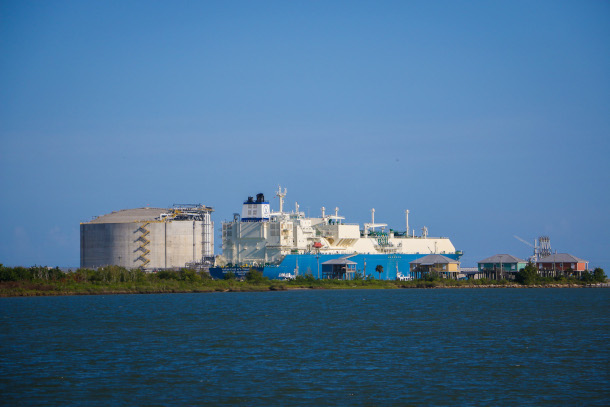
The Calcasieu Pass liquefied natural gas (LNG) export facility in Cameron Parish, Louisiana, US, is operated by Venture Global Calcasieu Pass, a subsidiary of US-based LNG production company Venture Global LNG. (Photo: Halle Parker)
The Biden Administration has paused new export permits of liquefied natural gas over concerns that these enormous facilities would emit millions of tons of greenhouse gases every year. Reporter Halle Parker of WWNO in New Orleans joins Host Jenni Doering to discuss why LNG exports have been rising in recent years and the impact they are having on the Gulf Coast and the global climate.
Transcript
O’NEILL: From PRX and the Jennifer and Ted Stanley Studios at the University of Massachusetts, Boston this is Living on Earth. I’m Aynsley O’Neill.
DOERING: And I’m Jenni Doering.
The Biden administration has paused new export permits of liquefied natural gas over concerns that these enormous facilities would emit millions of tons of greenhouse gases every year. Environmentalists hailed the move and canceled a sit-in protest planned at the Department of Energy headquarters this month. DOE said that it will conduct an environmental review focused on better understanding energy costs and methane emissions from liquified natural gas. The last review of “LNG” export projects was in 2018 when capacity was 4 billion cubic feet per day, according to DOE. That capacity has increased by more than threefold and would rise further if the paused projects come online. Halle Parker is an environment reporter on the coastal desk of station WWNO in New Orleans. She’s working on a forthcoming 3-part series for WWNO covering the export boom and following American gas around the world and she joins us now. Welcome back to Living on Earth Halle!
PARKER: Thanks for having me again, Jenni.
DOERING: So Halle, the Biden administration decided to pause multiple new LNG or liquefied natural gas facilities. What are the politics involved in this decision?
PARKER: Yeah, so this was a really, really huge decision. And it was the result of years of protest from different environmental activists on the coast, different local groups on the Gulf Coast, where this proposed build out of liquefied natural gas export terminals is really happening. And so then over the past few months, a bunch of national green groups started to get involved and now that it is an election year, they really got strategic with what they were asking for. They knew that, you know, it wasn't going to be possible to just completely shut down liquefied natural gas production in the US. I mean, it's a huge industry and it's growing right now. But they knew that they would legally be allowed to ask for a pause, like a little bit of a hiatus for the Biden administration to actually be able to sit and review whether all of these facilities that are being proposed and are coming to their desk are actually needed. And so that's what this pause is allowing them to do.
DOERING: And you mentioned these green groups, why do they care so much, especially when natural gas has sometimes been called a bridge fuel from dirty sources like coal in the past?
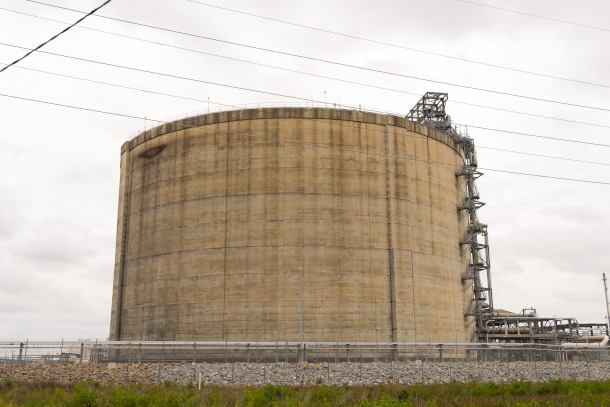
A gas tank at the Cameron LNG facility in Hackberry, Louisiana. (Photo: Halle Parker)
PARKER: So, yes, gas has allowed us to transition, especially us as a country, to transition from dirtier fuels like coal before but these gas export terminals are also kind of nicknamed climate bombs or carbon bombs. There's one facility that's proposed on the Gulf Coast, it's called CP2. And it would, if it was actually constructed, become the largest export terminal in the country. And beyond just exporting gas, it would emit up to almost 10 million metric tons of carbon each year. To put that in a context that is almost the same amount of the annual emissions that Costa Rica puts off in a year. So a whole country.
DOERING: Halle, the Gulf Coast of the US is a really important place for gas refining and for exports already. So what kinds of impacts could some of these proposed projects like CP2 have on Louisiana's coastline?
PARKER: So there are a lot of concerns with these facilities. There's also a lot of people who are advocating for them, because where they're being proposed, and Louisiana is actually for the most part, this area in Southwest Louisiana, a parish called Cameron Parish. And they've historically relied on the offshore oil and gas drilling industry for a lot of their work. But that industry has declined at times, they've also been hit by a lot of different hurricanes. So they've seen their population cut by a lot because people haven't been returning. And so they've kind of viewed this gas industry as a new way to start building resources again, and start paying for what's needed to take care of their citizens. And it is bringing in a lot of tax revenue for that area. But, then there's also the concern of the fact that these facilities are being built in these coastal areas that, again, are known to be hit by hurricanes. And so there's a question of safety there. And also, they're worried about, you know, shutdowns. There's a plant that already exists down in Cameron parish in Southwest Louisiana called Calcasieu Pass LNG. The company who operates it Venture Global, has said that it's safe, everything is fine over there, but they have had a lot of different issues in terms of reporting blackouts that have led to releases of pollution that weren't intended. And all of that has kind of like raised questions for some of the residents living nearby.
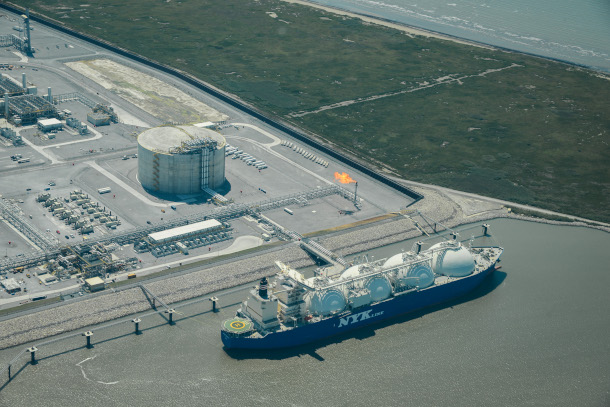
Gas flaring from the Calcasieu Pass LNG in Cameron, Louisiana. Gas flaring puts multiple chemicals out into the air including benzene, which can give people who live nearby headaches, tremors and irregular heartbeats. Benzene can also cause cancer. (Photo: Halle Parker)
DOERING: Yeah, what have you been hearing from local residents in the area?
PARKER: Yes, so I've talked to quite a few of them. A man that I've spoken to a lot John O'ler he's a retired environmental engineer. And he lives in a trailer, less than a mile from Calcasieu Pass. And he has said that he sees flaring almost every night, or at least he did in their first year of operation. And he also has the receipts, because each time he sees that flaring, he's taking photos and documenting them. And so he is one of the ones who is much more skeptical of whether this direction is the right one for the community to go in. But then you go to maybe like a public hearing, like I've gone to where people who are working for companies who are maybe supplying catering or doing cleaning services or maybe their son works at the plant, they're much more likely to have a more positive outlook on what opportunities these plants present.
DOERING: And I understand that the country started exporting LNG in 2016. And we're now one of the biggest exporters. How did we get here?
PARKER: Yeah, so to figure out how we got here, we'd have to go all the way back to talking about when horizontal fracturing became a thing and that you're more likely to have heard it called fracking. And that technology made it, you know, so easy for us to get gas over in the US that we started to have this surplus. And that's why historically, natural gas prices in the US have been so low why everybody calls gas, this, you know, this cheap resource, cheap way to get energy. But over time, you've seen the country commit to transitioning away from fossil fuels. And you've also seen the oil and gas industry start to look for new markets for their product. So liquefied natural gas exports are a way for them to expand who their customer base could be. Historically, the gas that has been drilled in the US has just, you know, stayed in the US. And that's through a system of pipelines, and it's usually transported through. But opening up the world to LNG being able to cool down this gas and ship it in actual vessels overseas gives the gas industry, more countries to sell their product to.
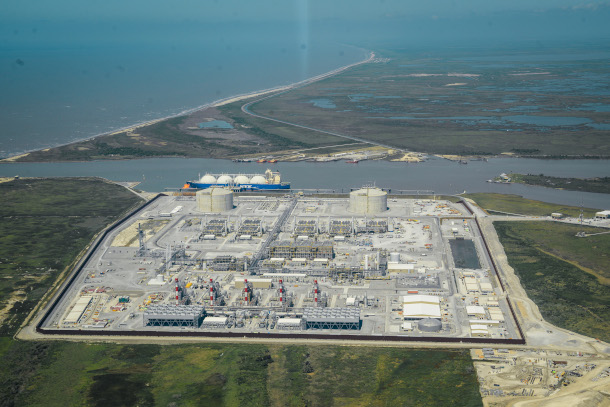
Calcasieu Pass LNG in Cameron, Louisiana. President Biden has paused pending liquified natural gas export terminals like the one pictured above while his administration reassesses how best to determine whether additional infrastructure serves the public. (Photo: Halle Parker)
DOERING: So there's a huge push from industry itself. And of course, the Biden administration has pretty strong climate goals. But in fact, it has been expanding liquefied natural gas production even more. Why is that?
PARKER: Yes. So to understand that, we'd have to go back a couple years to 2022. And remind ourselves of when Russia started invading Ukraine. When that happened, you know, the European Union has historically relied on Russia to supply gas. But in order to try to pressure Putin to stop this invasion, they were really looking to cut off Russian gas. And then the Nord Stream, the major gas pipeline, that would be bringing that product in, ended up exploding. And those are still not operating. So there's this huge concern that Europeans wouldn't have enough gas to heat their homes during the winter as a result. That meant President Biden made this big pledge to ramp up our exports of gas in order to help and meet the need and support our quote unquote, allies. And that really opened up this like huge faucet of proposals from the gas industry to build these new export plants. Although I will say a lot of these new export plants won't be done for years and this crisis with European energy might not exist them.
DOERING: So you mentioned that it takes in some cases, years for these projects to come online. But some folks are looking at the long term of the climate and wondering, you know, how will this kind of expansion of liquefied natural gas affect the world's ability to meet the Paris Agreement, climate goals of keeping warming below 1.5 degrees Celsius? What's the information we have on that?
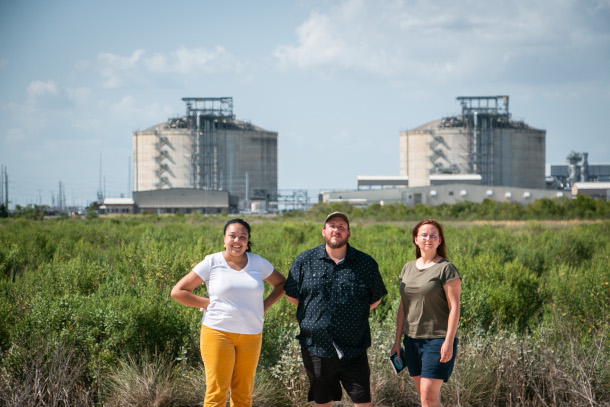
Environmental advocates Jade Woods of CIEL and James Hiatt, founder of For a Better Bayou pose in front of Cameron LNG with German Parliament member Kathrin Henneberger. (Photo: Halle Parker)
PARKER: Yeah, absolutely. Just to say that is a huge reason why this pause on LNG exports is happening in the first place. There's been several reports that have come out, one came out last year from the Natural Resources Defense Council and it talks about how LNG really isn't a very effective strategy to actually reduce our planet warming emissions. And they actually conclude that it could make it nearly impossible for us to keep global temperatures from increasing above that 1.5 degrees Celsius mark that you mentioned, Jenni. And that's partially because of the lifecycle of natural gas, you know, it's very, depending on where they're getting the gas from. It can be very leaky, there's a lot of methane emissions associated just with gas drilling. And in some cases, that can mean that LNG produces even more carbon than coal ultimately, if you look over the course of its whole lifecycle.
DOERING: Now given the geopolitical issues of Europe, cutting down on Russian gas, how are people in Europe responding to this move by the Biden administration?
PARKER: I haven't heard as much backlash from European countries over this. In fact, when Biden made this announcement, there were 70 lawmakers who are part of Parliament's across the EU, who wrote a letter to support the decision saying that they want Biden to take a step back and figure out how many export facilities are actually needed versus just you know, letting this bonanza continue indefinitely. Just to be able to like have that research and figure out if all of these facilities are in the public's interest. I had spoken with a German environmental advocate a few weeks ago, and there's a coalition of more than a dozen environmental groups from Germany who had filed a letter asking the Federal Energy Regulatory Commission to deny permits for CP2 that really large facility planned in Louisiana that we talked about earlier. And that's partially because they felt there were human rights implications because of where these facilities are being built. Like I mentioned, a lot of these communities are already historically dependent on fossil fuels. And some of them are also already heavily industrialized. So there's this question for some over in the EU about whether they might be exporting human rights violations in exchange for importing the gas they need to heat their homes.

Halle Parker reports on the environment for WWNO's Coastal Desk. (Photo: Courtesy of Halle Parker)
DOERING: That sounds like a real moral dilemma.
PARKER: It absolutely is.
DOERING: So coming back to these major liquefied natural gas projects that the Biden administration has put on hold for now. What’s next?
PARKER: So what's gonna happen is the Department of Energy is going to start this review. Through the course of their analysis, they're going to start weighing different factors from effects on the economy, from effects on health, from effects on the climate, and use the information that they gathered to issue some sort of determination about whether the development of liquefied natural gas export plans are in the country's interest. When I was on a call with Secretary Jennifer Granholm, she was not really clear about how long that process will take. But there is a belief that it will likely take through the end of this year so that pause will likely still be in place by the time we are casting our votes in November.
DOERING: Halle Parker is a reporter for WWNO in New Orleans. Thank you, Halle.
PARKER: Thanks, Jenni.
Links
Learn more about coastal desk reporter Halle Parker
Carbon Brief | “Q&A: What Does Biden’s LNG ‘Pause’ Mean for Global Emissions?”
Reuters | “Biden Pauses LNG Export Approvals After Pressure From Climate Activists”
NRDC | “NRDC Report: U.S. LNG Exports Undermine Climate and Environmental Goals”
Living on Earth wants to hear from you!
Living on Earth
62 Calef Highway, Suite 212
Lee, NH 03861
Telephone: 617-287-4121
E-mail: comments@loe.org
Newsletter [Click here]
Donate to Living on Earth!
Living on Earth is an independent media program and relies entirely on contributions from listeners and institutions supporting public service. Please donate now to preserve an independent environmental voice.
NewsletterLiving on Earth offers a weekly delivery of the show's rundown to your mailbox. Sign up for our newsletter today!
 Sailors For The Sea: Be the change you want to sea.
Sailors For The Sea: Be the change you want to sea.
 The Grantham Foundation for the Protection of the Environment: Committed to protecting and improving the health of the global environment.
The Grantham Foundation for the Protection of the Environment: Committed to protecting and improving the health of the global environment.
 Contribute to Living on Earth and receive, as our gift to you, an archival print of one of Mark Seth Lender's extraordinary wildlife photographs. Follow the link to see Mark's current collection of photographs.
Contribute to Living on Earth and receive, as our gift to you, an archival print of one of Mark Seth Lender's extraordinary wildlife photographs. Follow the link to see Mark's current collection of photographs.
 Buy a signed copy of Mark Seth Lender's book Smeagull the Seagull & support Living on Earth
Buy a signed copy of Mark Seth Lender's book Smeagull the Seagull & support Living on Earth

